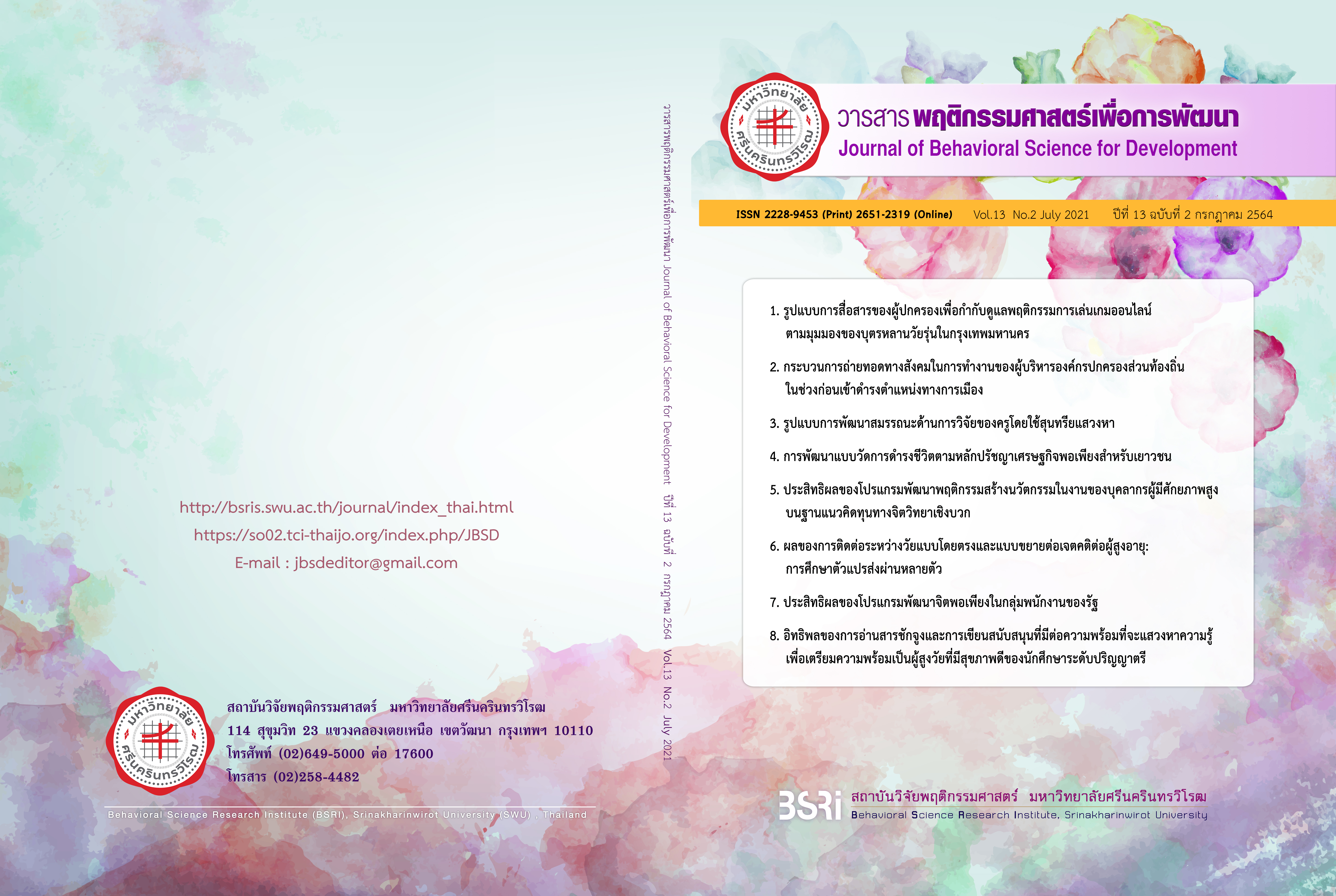Development of a Living Scale Based on Sufficiency Economy Philosophy for Youths
Keywords:
youths, living scale based on sufficiency economy philosophy, psychometric properties, invariance measurementAbstract
The purposes of this study were 1) to develop a valid and reliable living scale based on sufficiency economy philosophy for youths 2) to examine the factor structure of living scale based on sufficiency economy philosophy, and 3) to examine measurement invariance of the living scale based on sufficiency economy philosophy. The sample consisted of 366 undergraduate students in public universities obtaining from online data collection. The research instrument was the living scale based on sufficiency economy philosophy which contained 20 items. The data were analyzed using confirmatory factor analysis for testing the factor structure and measurement invariance of the scale. The results showed that the living scale based on sufficiency economy philosophy had good psychometric properties: validity and internal consistency reliability (Cronbach’s alpha coefficient = .83). The results also indicated that the structure of living scale based on sufficiency economy philosophy model consisted of 4 factors: (1) living with moderation, (2) living with rationality, (3) living with immunity, and (4) living with virtue. The fit indices for the model were χ²/df = 1.93, GFI = .93, CFI =.9 and RMSEA = .05. The measurement invariance of the scale across groups in terms of structure and factor loading models was found (χ²/df = 1.60, CFI =.94 and RMSEA = .04). The living scale based on sufficiency economy philosophy is a multidimensional scale that has the potential for significant usage in the development and testing of theory, as well as practical application.
References
Barua, P., & TejativaddhanaI, P. (2019). Impact of application of sufficiency economy philosophy on the well‐being of Thai population: A systematic review and meta‐analysis of relevant studies. Journal of Population & Social Studies, 27(3), 195-219. http://doi.org/10.25133/JPSSv27n3.0013
Bhanthumnavin, D. (2008). Kānwičhai phư̄a kānphatthanā khrư̄angmư̄ wat thāng čhit bǣp phahu radap nai bō̜ribot khō̜ng pratyā sētthakit phō̜phīang [Empirical development of multi-level psychological assessments in the context of the philosophy of sufficiency economy]. National Research Council of Thailand.
Bhiromrat, K. (2010). Phrưttikam kāndamnœ̄n chīwit tām lak pratyā sētthakit phō̜phīang khō̜ng naksưksā mahāwitthayālai rātchaphat. nai khēt Krung Thēp Mahā Nakhō̜n [Students conduct of Rajabhat universities in Bangkok on the way of self-sufficiency economy]. Suan Sunandha Rajabhat.
Choochom, O. (2014). Antecedents and consequences of psychological immunity. Humanities and Social Sciences Review, 3(3), 191-197.
Choochom, O. (2015). A causal relationship model of living behavior based on sufficiency economy philosophy for university students. Procedia Social and Behavioral Sciences, 177, 260-264.
Choochom, O., Sucaromana, U., Chavanovanich, J., & Tellegen, P. (2019). A model of self-development for enhancing psychological immunity of the elderly. The Journal of Behavioral Science, 14(1), 84-96.
Lunsakawong, C., Panhoon, S., & Anusanananun, S. (2016). Kānphatthanā bǣp wat khunnalaksana kān yū yāng phō̜phīang samrap nakrīan chan matthayommasưksā tō̜n ton tām laksūt kǣn klāng kānsưksā naphư̄n thān Phutthasakkarāt sō̜ngphanhārō̜ihāsipʻet [Construction of a sufficient life scale aligned with the basic education core curriculum B.E. 2551(A.D. 2008) for lower secondary students]. SDU Research Journal, 12(1), 135-154.
Demir, E. (2017). Testing measurement invariance of the students affective characteristics model across gender sub-groups. Educational Sciences: Theory & Practice, 17, 47-62. http://doi.org/10.12738/estp.2017.1.0223
Hair, J., Black, W., & Anderson, R. (2010). Multivariate data analysis. Prentice-Hall.
Malhotra, N. K., & Dash, S. (2011). Marketing Research an Applied Orientation. Pearson Publishing.
Office of the Civil Service Commission. (2016). Pratyā khō̜ng sētthakit phō̜phīang læ kānprayukchai [Application of sufficiency economy philosophy]. Office of the Civil Service Commission.
Office of National Economic and Social Development Board. (2017). The twelfth economic and social development plan (2017-2021). Office of National Economic and Social Development Board.
Sasitho̜rnsaowapha, N. (2018). Kāndamnœ̄n chīwit tām lak pratyā sētthakit phō̜phīang [Way of life by means of the philosophy of sufficiency economy]. Kasem Bundit Journal, 19(2), 155-168.
Şekercioğlu, G. (2018). Measurement invariance: Concept and implementation. International Online Journal of Education and Teaching, 5(3), 609-634.
Strainer, D. (1994). Figuring out factors: the use and misuse of factor analysis. CANADIAN Journal of Psychiatry, 39(3), 135-140. https://doi.org/10.1177/070674379403900303
Sufficiency Economy Movement Sub-Committee. (2007). Sufficiency economy and implications. Office of National Economic and Social Development Board.
Tekhanmag, K. (2013). Patčhai thī samphan kap phrưttikamkārot nœ̄n chīwit tām pratyā sētthakit phō̜phīang khō̜ng naksưksā mahāwitthayālai rātchaphat Phra Nakhō̜n Sī ʻAyutthayā [Factors Related to Life Styles by Sufficiency Economy Philosophy of Students of Phranakhon Si Ayutthaya Rajabhat University]. Si Ayutthaya Rajabhat University.
Teungfeng. R. & Kerdlapee, J. (2013). kān bō̜riphōk tām nǣo phrarātchadamri pratyā sētthakit phō̜phīang khō̜ng naksưksā radap ʻudomsưksā : kō̜ranī sưksā mahāwitthayālai [Consumption behavior of undergraduate students following the royal sufficiency economy philosophy: a case study at rajamangala university of technology Suvarnabhumi Nonthaburi center]. Journal of Social Development, 15(2), 67-71.
Yaemyuen, A. (2017). Patčhai chœ̄ng hēt bǣp būranākān thāng čhit phphīang čhit laksana læsathānakān thī kīeokhō̜ng kap phrưttikam kāndamnœ̄n chīwit tām lak pratyā sētthakit phō̜phīang khō̜ng yaowachon nai chumchon : wikhro̜ mōdēn samakān khrōngsāng [Sufficient mind, psychological characteristics, and situations predicting sufficiency economy behavior of youths: An analysis of structural equation modeling]. Journal of Social Development, 19(1), 23-37.
Downloads
Published
How to Cite
Issue
Section
License
Copyright (c) 2021 Journal of Behavioral Science for Development

This work is licensed under a Creative Commons Attribution-NonCommercial-NoDerivatives 4.0 International License.



